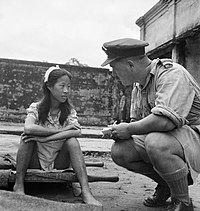Japanese Prime Minister Shinzo Abe denies wartime responsibility for sex slaves
Friday, March 2, 2007

Source: IWMCollections IWM Photo No.: SE 4523
Prime Minister Shinzo Abe, the leader of the conservative Liberal Democratic Party of Japan, denied responsibility for military brothels set up during World War II. Speaking to reporters on Thursday, Abe said, "There is no evidence to prove there was coercion, nothing to support it. So, in respect to this declaration, you have to keep in mind that things have changed greatly."
His statement contrasts with earlier comments in which he seemed to support a 1993 government declaration that Japan had in fact set up wartime military brothels.
Korean believe around 200,000 women from a multitude of different nations were forced into brothels during the war, where they would be raped dozens of times daily. However, conservative elements in the Japanese government have often denied or minimized the extent of war crimes taking place during World War II.
In 1992, historian Yoshiaki Yoshimi discovered a document titled Regarding the Recruitment of Women for Military Brothels in the Defense Agency's library (The content of this order is "A Japanese army prohibits the use for the malignant Korean people broker. "), prompting the government's 1993 declaration. Over the years, several former sex slaves have stepped forward, providing testimony in direct contrast with the Japanese government's.
Sources
edit- Norimitsu Onishi. "Japan's prime minister denies responsibility for wartime brothels" — International Herald Tribune, March 2, 2007
- Carl Freire. "Growing Chorus Slams War-Brothel Remarks" — The Washington Post, March 2, 2007
- Irish Examiner. "Sex slaves 'were not coerced' says Japanese Prime Minister" — Irish Examiner, March 3, 2007
- Daniel Kohns. "Honda Testifies in Support of Comfort Women" — http://honda.house.gov/, February 15, 2007